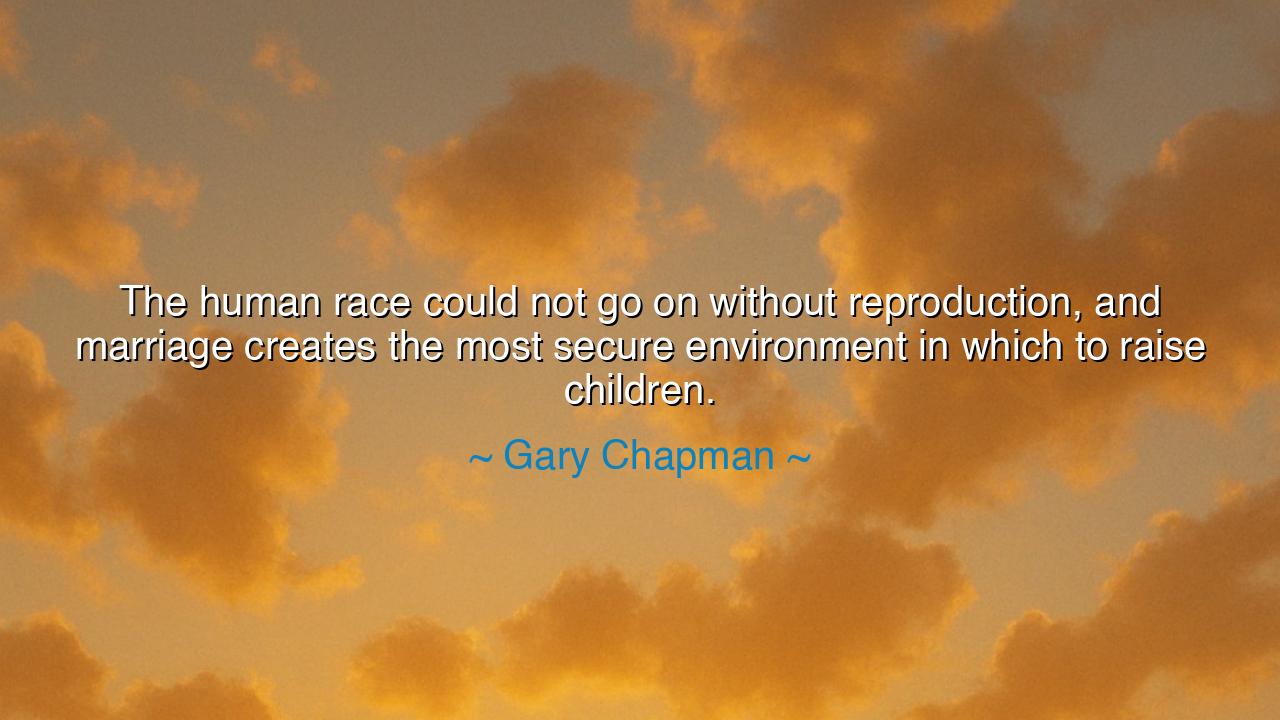
The human race could not go on without reproduction, and marriage
The human race could not go on without reproduction, and marriage creates the most secure environment in which to raise children.






In the words of Gary Chapman, “The human race could not go on without reproduction, and marriage creates the most secure environment in which to raise children.” These words draw upon one of the oldest truths known to mankind: that life must renew itself, and that renewal requires both continuity and care. Reproduction is the natural force by which humanity survives, but survival alone is not enough. Without nurture, without a shelter of stability and love, children falter, and with them, the future of the race itself. Thus, Chapman lifts up marriage not merely as a private bond of affection, but as a sacred institution upon which the endurance of civilization rests.
The ancients themselves held this belief firmly. Among the Greeks, marriage was regarded not only as a union of love but as a duty to the polis, the city-state. To raise strong sons and wise daughters was to ensure that Athens or Sparta endured beyond one’s own fleeting years. In Rome, too, laws were written to encourage marriage and childbearing, for the empire knew that its legions and leaders would one day come from the nurseries of the present. Though empires rose and fell, they all recognized this: without children, the people perish; without a stable foundation for children, nations crumble.
History offers us examples of this truth embodied. Consider the story of the early settlers in Plymouth Colony. Surrounded by hardship, famine, and death, it was the marriages and family bonds that anchored the community. It was in the security of those small wooden homes, however fragile, that children were nurtured to grow into a generation capable of building a nation. The colony survived not because of weapons alone, but because parents, bound in covenant, bore the burden of raising children with courage and discipline.
Chapman also points to security, which is more than the absence of danger. Security is consistency, predictability, the assurance that love will not vanish when hardship comes. In marriage, two souls pledge not only to one another, but also to their children, that the home will stand even when storms beat upon it. To raise children without such stability is like planting seeds in shifting sand: they may sprout, but they cannot root deeply. To raise them within marriage is to plant them in soil rich with promise, where discipline and affection together bring forth growth.
This does not mean that only those born of marriage can flourish—history has shown otherwise—but Chapman reminds us that when marriage is honored, when it is strong and whole, it provides the best chance for the next generation to thrive. The failures of families often echo for decades, but the strength of families also endures for centuries. In the home, children learn trust or betrayal, stability or chaos. And these lessons they carry into the world, multiplying their impact upon nations.
The deeper wisdom here is that marriage is more than romance—it is responsibility. To marry is to acknowledge that love has consequences, that life creates life, and that the future of the human race is written in the laughter and tears of children. The ancients saw marriage as covenant, the binding of lives not only for pleasure but for posterity. Chapman renews this ancient teaching: that the private vow of two lovers becomes the public foundation of society.
The lesson for us is clear: if we wish to see humanity flourish, we must honor both reproduction and the bonds that nurture it. Let love not be fleeting, but steadfast. Let marriage not be dismissed as a relic, but recognized as a fortress for children. And let us remember that in raising children well, we are not only preserving our own families, but shaping the destiny of the entire human race.
Practical steps flow from this wisdom. Protect and nurture your marriage, for in doing so, you protect the lives of those yet to come. Raise children with both love and discipline, ensuring they are secure in affection and firm in virtue. Honor the responsibility of family, resisting the temptation to treat it lightly. And above all, remember that your home is a seedbed of the future: from it will grow the next poets, warriors, leaders, and healers of the world.
Thus, Gary Chapman’s words echo like the voices of the ancients: the race endures not by chance, but by covenant; not by survival alone, but by the bonds of marriage that create havens where children may grow. Let all who hear these words take them as both reminder and charge: that in building strong homes, we build strong futures, and in raising children well, we raise up the destiny of mankind.






AAdministratorAdministrator
Welcome, honored guests. Please leave a comment, we will respond soon